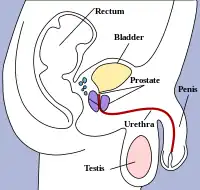Man
A man is an adult male human. He is the opposite of a woman. People use the word "man" (one man, two or more men) to talk about gender. Manhood is the period in a male's life after he changes from a boy. A boy is a male child; a female child is called a girl. After boys reach maturity, they can be called a man.

Like most other male mammals, a man inherits an X chromosome from his mother and a Y chromosome from his father. The men's rights movement is a group that tries to fight for men's rights and opposes misandry.
There are also those who identify as a man even though they are not one (they are not a member of the male sex). They are referred to as a man in certain societies
Biology

There are some sexual differences between a man and a woman. Men have sex organs which we call "external" (not inside the body). But many parts of the male reproductive system are internal too. The study of male reproduction and sex organs is "andrology".

Men normally have the same illnesses as women, but there are some sexual illnesses which men have only, or more often.
There are more differences between men and women, not only sexual differences.
- Some people say men, as a group, are more aggressive than women; they want to fight more. But most research has found that men and women are equally aggressive.
- In modern western society, few men wear make-up or clothing of the sort women traditionally wear.
Some examples of secondary sexual characteristics in male humans:
- more pubic hair
- more facial hair
- more body hair
- larger hands and feet than women
- broader shoulders and chest
- narrower hips
- larger skull and bone structure
- larger brain
- greater muscle mass
- a more visible Adam's apple and deeper voice
- a longer shinbone
Men are usually taller than women. In 1996, the average height of men around the world was 171 cm.[1]
Biology is not the only thing which makes people feel they are men, or that other people are men. Some people were born in a female body but feel that they are men. We call these transgender or transsexual men.[2] Some men can have a hormone or chromosomal difference. Some men have other intersex conditions. Some of those intersex people who people said were female (girls) when they were born want to change this later in their lives.[3]
Related pages
- Violence against men
- International Men's Day
References
- Roser, Max; Appel, Cameron; Ritchie, Hannah (8 October 2013). "Human Height". Our World in Data.
- "Understanding transgender people, gender identity and gender expression". American Psychological Association. Retrieved 26 March 2024.
- "What's the difference between being transgender or transsexual and having an intersex condition? | Intersex Society of North America". isna.org. Retrieved 26 March 2024.
